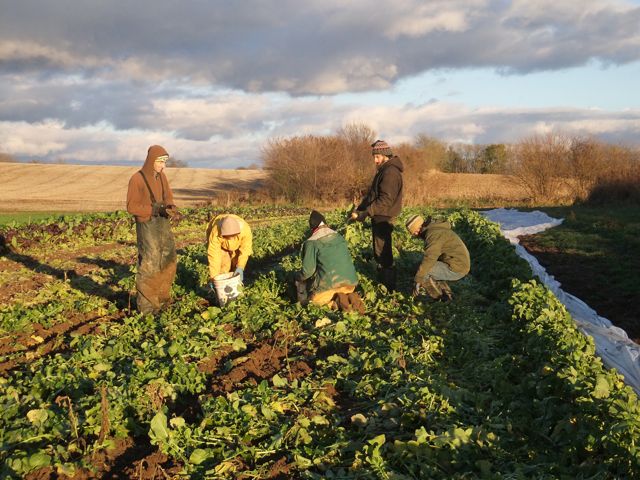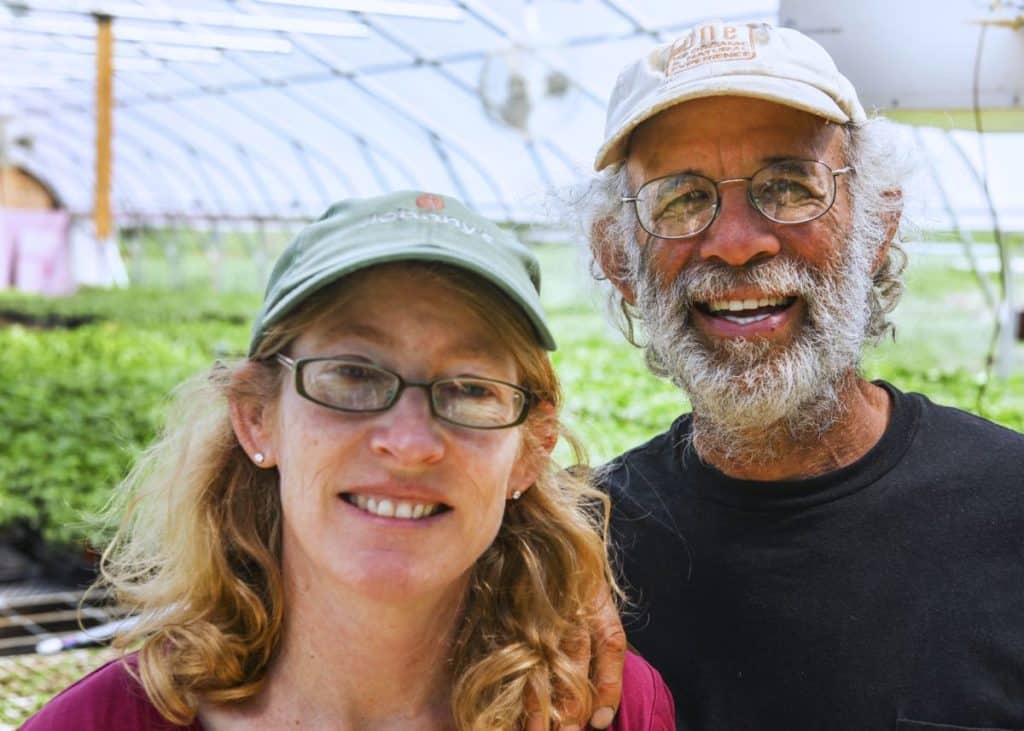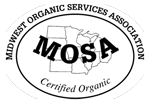URGENT: Please comment on the food safety act
- On: November 06, 2013
 0
0

The crew harvests winter radishes. It was too muddy to use our mechanical root harvester, plus we find that harvesting by hand is easier on the brittle radishes. From left, Jon, Kelty, Alex, Clint, and Kyle.
Purple EOW members, this is your final delivery (November 7/8).
Weekly and green EOW members, you will receive your final box next week (November 14/15)
Wrap-up for purple EOW members. Thank you for being members of our farm this year! We hope you have enjoyed the experience. A few thoughts:
– Please read next week’s email for our annual survey. We will incorporate your comments into our plans for next year.
– Please return all your empty CSA boxes.
– We expect to open 2014 registration soon for returning Tipi members. Watch for emails from us.
Please comment on the Food Safety Modernization Act
The Food Safety Modernization Act (FSMA) is a piece of legislation currently under review by the Food and Drug Administration. It is an intimidating set of regulations that seek to overhaul food safety in the USA. There are sound ideas in the act, such as protecting fresh produce from exposure to raw manure. Unfortunately, this complex piece of legislation has enough bad ideas to drive many small and medium vegetable farms out of business. As summarized by the Michael Fields Agricultural Institute, “The (FDA)’s first draft of new safety rules has big problems. They will be costly, especially for smaller farmers. They conflict with National Organic Program rules and undermine conservation practices. They undercut CSAs and other essential markets in local food systems. What is bad for our farmers is bad for our consumers.”
Will it put us out of business? No, but it will make our job much more difficult, without improving the quality of your food.
The National Sustainable Agriculture Coalition (NSAC) has done a good job summarizing the current draft of the legislation. Go to the NSAC website to learn more about the Food Safety Act, and to read their assessment of the top problems with the proposed regulations.
The FDA is accepting comments on the FSMA until November 15. If you are concerned about maintaining your community of local farms, we encourage you to submit a comment to the FDA.
The Sustainable Ag Coalition has a good instructions on how to submit an effective comment, as well as links to the government submissions pages. We encourage you to submit your comment under both the Produce Rule and the Preventative Controls Rule. Our farm and CSA (and your food supply) will be affected by both pieces of legislation. Beth
Steve’s take on the Food Safety Modernization Act.
We don’t often talk with you about the cultural and political pressures that affect us as organic famers. Something is brewing that we want you to know about. The U.S. Food and Drug Administration (FDA) is putting together an administrative rule called the Food Safety Modernization Act (FSMA). Congress authorized this act, intending to improve the safety of the American food supply.
The FSMA, as currently drafted, would have a huge negative effect on our farm and other similar small and medium-sized vegetable farms, whether organic or conventional. The food safety rules call for extreme preventative measures that have not been shown to reduce foodborne illness. The FDA expects that compliance would cost a farm like Tipi about $30,000 per year. Smaller, younger farms could spend half their net income meeting these standards, forcing them out of business.
The whole draft rule is over 3,000 pages. I have not read all of it, but have gone through a few especially relevant topics. I’m relying on small farm and sustainable ag advocates who have digested and summarized this sprawling document.
The FSMA, as written in draft, is a true threat to the locally-oriented organic farms that feed you through CSAs, food coops, farmers’ markets and farm-to-school programs. See above for links to some well-researched information.
The FDA is taking comments on the FSMA rules through next Friday November 15. We ask you to help stop this damaging regulation by sending a short comment to the FDA. You don’t need to be overly technical. A comment like the one below (in your own words of course) would register your opinion:
“We are CSA members in Wisconsin and our family (or household) eats more fresh produce because of our CSA commitment. Do not put burdensome, unproven mandates on our farmers! We trust their food and their judgement. Your proposed FSMA rules would damage the local farms that we depend on for safe, high-quality food.”
Thank you for your time considering this. Steve
Veggie List and Veggie Notes (week #25, purple EOW)
Tip for cutting winter squash: If you want to peel or dice your butternut squash, microwave the intact squash on high for one minute. That’s enough to warm and soften the squash, making it much easier to peel. I find this trick useful even when just cutting the butternut in half.
Russet potatoes, about 3.5 lb
Sweet potatoes (unwashed), about 2 lb
Butternut winter squash
Collard greens
Leeks, about 1.5 lb
Carrots, 2 lb
Beauty Heart radish, 1 lb, about 2
Onion, 1
Broccoli, 1 modest head or some side shoots
Next week’s box will probably contain green cabbage, butternut squash, sweet potatoes, beets, celeriac, carrots, onions and Brussels sprouts.
Russet potatoes – Chris Malek sent us big beautiful russets this week, perfect for baking.
Sweet potatoes – These are unwashed. Sweet potatoes need warm storage. It is too risky to wash them this time of year without a warm place to dry them, so we ran them through a dry brusher to knock off most of the dirt. This delivery is mostly the Beauregard variety. Here are a few things we’ve learned about sweet potatoes:
– Store your sweet potatoes at room temperature. They suffer chilling injury below 50 F.
– The sweet potatoes we grow require slightly longer cooking than ones from the supermarket, perhaps because they contain higher moisture so soon after harvest. Cook thoroughly for best flavor and texture.
– Sweet potatoes are good at any size. We have cooked everything from tiny to jumbo and consistently find that all sizes taste good.
– We have a new favorite way to roast sweet potatoes. We used to prepare sweet potato fries. Now we just quarter the potatoes, rub with olive oil, dust with salt and place cut-side-down on a cookie sheet. Roast in a 450 F oven without turning until soft. The flavors will caramelize (like sweet potato fries) but preparation is simpler and the cooking time less exacting. Slender sweet potato fries go from undercooked to overcooked in the blink of an eye.
Butternut winter squash – Almost everyone will receive the JWS6823 variety. We tried several new winter squash varieties this year. This one did quite well and has good flavor. This variety produces small squash, about the same size as the Metro we sent a few weeks ago.
Collard greens – These end-of-season collards need more extended cooking than tender spring-grown collards. They can handle long braising or simmering. Remove the midveins before cooking.
Beauty Heart radish (round, white and pale green exterior, bright pink interior) – The interior color is lovely. Slice thinly and add to salads, cook lightly in mixed vegetable medleys or cut into matchsticks and add to pasta salads. We enjoy grated carrot and Beauty Heart salads all winter.



